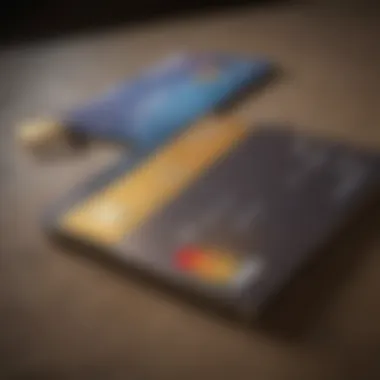Where to Get a Money Order with a Credit Card


Intro
The idea of using a credit card to obtain money orders may sound unconventional to many. However, this approach is increasingly relevant in our fast-paced financial landscape. Understanding how to navigate money orders using a credit card can be beneficial for various reasons, such as limited cash availability or specific transaction requirements. In this article, we will explore the ways you can get money orders with a credit card, the associated costs, and the practical considerations involved.
Understanding Financial Concepts
To fully grasp the process of obtaining money orders with a credit card, it is essential to understand a few key financial concepts first.
Definition of Key Terms
- Money Order: A money order is a payment order for a pre-specified amount of money. It is a secure and convenient alternative to cash or checks.
- Credit Card: A credit card allows you to borrow funds from a pre-approved limit to make purchases or pay debts.
- Transaction Fees: These are charges that come into play when using a credit card to purchase a money order.
Importance of Financial Literacy
Financial literacy has become an essential skill in today's world. It involves understanding how to manage your finances effectively, including knowing the benefits and risks of various payment methods. By grasping these concepts, young professionals and other consumers can make more informed decisions regarding their financial transactions.
Practical Considerations of Using a Credit Card for Money Orders
Using a credit card to obtain money orders is not without its limitations. Understanding these limitations can help you make better choices in your financial dealings.
- Availability: Not all locations that sell money orders accept credit cards. Places like supermarkets, convenience stores, or dedicated financial services may have different policies.
- Fees: Transaction fees may apply when you use your credit card to purchase a money order. These fees typically range from a few dollars to a percentage of the amount you wish to order. It is important to check with the issuer for exact fees.
- Cash Advance Charges: Some credit cards treat money orders as cash advances, leading to higher fees and interest rates. Before you proceed, it's wise to confirm with your credit card provider how they will categorize your transaction.
Finale
In navigating the landscape of financial tools, knowing how to implement credit cards for money orders can save time and provide flexibility. As with any financial decision, being aware of the integral concepts, potential pitfalls, and overall benefits will empower consumers to act responsibly in their monetary transactions.
Understanding your options can significantly affect your financial health and the choices you make.
Through this article, we aim to equip you with the knowledge needed to approach money orders confidently, ensuring that your financial decisions align with your overall goals.
Understanding Money Orders
Money orders serve as a secure and reliable method of payment, traditionally used in situations where a check may not be accepted or when cash is too risky to carry. Understanding the concept of money orders is crucial for anyone considering using a credit card for this purpose. With the rise of electronic payments, the relevance of money orders in the financial ecosystem remains significant, especially for young professionals, students, and small business owners.
A money order provides the safety of cash with the convenience of a cheque. It assures recipients that the payment is guaranteed, as the issuer pre-pays the amount upfront. This can be particularly useful when making larger transactions, such as paying rent or purchasing goods from private sellers.
Furthermore, using money orders can offer a way to avoid bounce fees associated with personal checks. Regardless of one’s financial background, accessing a money order can be done without the need for a bank account, making it an inclusive financial tool for many individuals.
Definition and Purpose
A money order is a payment order for a pre-specified amount of money. Issued by agencies such as banks, post offices, and certain retailers, it is a safer alternative to cash in situations where sending money through the mail or making personal payments is necessary. The purpose of a money order is to serve as a secure method to transfer funds without needing a personal bank account. This can facilitate transactions involving individuals or businesses that may not have access to traditional banking services.
For users, it delivers peace of mind since the receiver can be assured of receiving the exact amount stated on the money order. The provider collects the funds upfront and guarantees them.
Comparison with Checks and Cash
When comparing money orders with checks, several differences come into play:
- Security: Money orders are generally viewed as more secure than personal checks since they are prepaid. This means they cannot bounce, which is a risk when dealing with personal checks.
- Acceptance: Money orders can be accepted where personal checks might not be. This is particularly pertinent in rental agreements or payments for services that require a guaranteed form of payment.
- Fees: There can be fees associated with purchasing money orders, usually less than the potential costs of bounced checks.
In contrast with cash:
- Risk: Carrying large amounts of cash poses a security risk. Money orders eliminate this concern while still providing a reliable payment method.
- Paper Trail: Money orders create a paper trail. This can be advantageous for record keeping and proof of payment, unlike cash, which lacks documentation.


Understanding these differences allows individuals to make informed choices about when to use a money order versus a check or cash, particularly when they consider using a credit card for the purchase.
The Concept of Using Credit Cards
Credit cards are a common method of payment in today’s consumer landscape. They offer both convenience and flexibility, which can be beneficial when obtaining a money order. Understanding the role of credit cards in this context helps consumers navigate their options effectively. This section explores the advantages and drawbacks of using credit cards to purchase money orders, providing clarity on the considerations one must bear in mind.
Benefits of Using a Credit Card
Using a credit card for buying money orders has distinct advantages:
- Convenience: Credit cards allow for quick and easy transactions. No need to carry cash or checks. This can be particularly advantageous in emergencies or when cash is not available.
- Rewards and Benefits: Many credit cards offer rewards programs, cashback, or points for every purchase. This means that purchasing a money order can also contribute to your overall rewards. For instance, using a credit card like Chase Sapphire Preferred can earn points that can be redeemed for travel or other benefits.
- Record Keeping: Transactions made with credit cards are automatically recorded. This can simplify tracking expenses and help with budgeting. It is easier to manage finances when there is a clear record of spending.
- Credit Building: Regularly using a credit card responsibly can help build credit history. This is beneficial for young professionals or students who are establishing their credit profiles.
Potential Drawbacks
Despite the benefits, using credit cards for money orders also has its challenges:
- Fees: Often, using a credit card incurs a cash advance fee. This fee can vary by issuer and can be a percentage of the transaction. It’s crucial to know what fees apply before proceeding.
- Interest Rates: If the balance is not paid in full before the next billing cycle, interest may accrue. This could lead to higher costs overall if the transaction is not managed carefully.
- Purchase Limits: Some credit card issuers have limits on how much can be charged as a cash advance or for money orders. It’s important to check these limits to avoid declined transactions.
- Fraud Risks: While credit cards come with fraud protection, using them increases the risk of data theft or fraud. Always ensure that the transaction is secure and monitor statements to catch any unusual activity early.
Overall, understanding both the benefits and potential drawbacks of using credit cards for money orders helps consumers make informed decisions that best suit their financial situations.
Where to Purchase Money Orders
Purchasing money orders is a fundamental step for those wanting to utilize this payment option. Understanding where to obtain them can streamline finances for various needs, including bill payments or money transfers. Money orders offer a secure alternative to cash or checks and can be acquired from multiple institutions. Knowing where to go is especially vital if someone aims to use a credit card for the purchase. This could enhance convenience and accessibility, especially for young professionals and busy students.
Banks and Credit Unions
Many banks and credit unions provide money orders directly at their branches. Utilizing these institutions can assure customers of security and reliability. Money orders from banks often come with lower fees compared to other locations. They are also more likely to accept credit cards for these transactions. However, not all banks may offer this service to non-account holders. Therefore, it is advisable to contact the specific institution beforehand to confirm their policies and fees.
Post Offices
Post offices are another common location for purchasing money orders. The United States Postal Service offers money orders at a reasonable price. Customers can use credit cards at certain locations, but this can vary. Maintaining a track of transactions is often simpler at post offices. However, service may be limited during certain hours, and not all post offices may have the same resources for funds.
Retail Locations
Retail locations are convenient spots for getting money orders. Many consumers may already visit these places regularly, making them an accessible option.
Convenience Stores
Convenience stores stand out due to their extended hours. Many of them offer money orders, making it a easily available choice for last-minute needs. The characteristic of convenience stores is their accessibility. However, the fees may be slightly higher than banks or post offices. Some stores may not provide full services and could limit the amount one can purchase.
Supermarkets
Supermarkets usually have money order services available, often in the customer service area. They cater to a diverse clientele. Supermarkets allow people to get money orders while grocery shopping, enhancing overall convenience. Still, like convenience stores, fees might be higher. Additionally, the staff may not always be fully trained on money order processes, leading to potential delays or mistakes during the transaction.
Pharmacies
Pharmacies also provide money order services, appealing to those who prefer getting important errands done in one trip. Pharmacies like CVS and Walgreens often offer this service. They are generally open long hours, which provides flexibility for consumers. Similar to supermarkets and convenience stores, fees can vary. Some pharmacies might lack sufficient staff to assist during peak hours, which could create inconveniences for customers.
Dedicated Financial Services
Dedicated financial services include specialized companies that deal specifically with money transfers or financial products. They can be convenient, especially for international transactions.
Money Transfer Services
Money transfer services like Western Union and MoneyGram represent a key alternative for customers needing to send funds quickly. Their global network allows simpler monetary transfers. These services accept credit cards for purchasing money orders. However, transaction fees can be high, depending on both location and amount.


Online Platforms
Online platforms provide yet another convenient means to purchase money orders. Websites often have straightforward processes for buying online. Companies like PayPal facilitate these transactions and allow consumers to pay with credit cards. The ability to carry out transactions from home is appealing. Nonetheless, individuals need to be cautious regarding security and potential identity theft when using these services. Additionally, the fees typical for online platforms could be more than other locations.
By exploring these options, one can find suitable places to purchase money orders. Each location has its unique aspects, advantages, and disadvantages. The goal remains to purchase efficiently and securely.
Transaction Process
Understanding the transaction process is crucial when obtaining a money order with a credit card. This knowledge helps potential buyers navigate the steps efficiently and emphasizes the necessary preparations. Beyond mere convenience, grasping this process allows individuals to estimate the cost and timing associated with a money order purchase. Knowing what to expect can minimize errors and enhance the overall experience.
Steps to Buy a Money Order
The procedure for purchasing a money order using a credit card can be summarized in a series of straightforward steps. Each step is important and requires careful attention.
- Select a Location: Choose a suitable place to buy a money order, like a bank, post office, or retail outlet that accepts credit cards.
- Prepare Your Card: Make certain that your credit card is ready for use. Check the credit limit and availability for transactions.
- Visit the Location: Go to the chosen outlet. Confirm that they provide money order services accepting credit cards.
- Request the Money Order: Inform the cashier or service representative that you would like to purchase a money order.
- Provide Necessary Details: Fill out the required forms, offering specific information needed for the transaction, including the payee name and amount.
- Complete the Payment: Hand over your credit card and pay for the money order. Be aware of any fees that may accompany this transaction.
- Collect the Money Order: After payment is processed, collect your money order and receipt. Ensure all details are correct.
These steps, while seemingly simple, demand thorough attention. Each one has its implications, especially regarding the fees involved in credit card transactions.
Information Required
When buying a money order, certain information will be required to complete the transaction successfully. Being prepared with this information can streamline the process and avoid unnecessary delays. Common information required includes:
- Payee Name: The individual or entity receiving the money order.
- Amount: The specific sum to be included in the money order.
- Purchaser's Details: Your name and address may also be requested for record purposes.
- Payment Method: A valid credit card (including other identification in some cases).
Having this information readily available will enhance efficiency during the purchase. Be mindful that some locations may have additional requirements, which can vary. Always check with the specific provider before your visit.
Knowing the steps and required information not only smooths the process but also guards against common pitfalls.
Fees and Limits
Understanding the fees and limitations associated with obtaining a money order using a credit card is essential. This knowledge helps consumers navigate the financial aspects efficiently. Two fundamental considerations are the typical fees for money orders and the specific fees tied to using credit cards.
Properly comprehending these fees and limits leads to better budgeting and financial planning. Moreover, being aware of cash advance fees can help users avoid unexpected costs during the transaction. This section will shed light on these essential aspects, ensuring that readers are well-prepared to use their credit cards for purchasing money orders effectively.
Typical Fees for Money Orders
When you decide to buy a money order, it's important to be aware of the typical fees involved. Money order fees can vary significantly depending on the provider. Generally, these fees range from $0.70 to $5.00, based on the amount of the money order and the issuing institution. For instance, banks might charge higher fees compared to retail locations or the post office.
Here are some points to keep in mind about these fees:
- Provider Varies: Fees often depend on where you get the money order. Banks tend to have larger fees compared to places like convenience stores.
- Amount of Money Order: Some places may have set fees that do not change regardless of the money order's amount, while others could adjust their fees based on the total amount.
- Hidden Costs: Always ask about any additional charges or hidden costs that may apply other than the standard fee.
Credit Card Cash Advance Fees
Using a credit card to obtain a money order often involves cash advance fees. These fees typically range from 3% to 5% of the amount withdrawn. Importantly, cash advances usually start accruing interest immediately, unlike regular credit card purchases. This can result in a more expensive debt over time.
To summarize the main points regarding cash advance fees:
- Percentage Based: The fee is usually a percentage of the cash withdrawal amount.
- Instant Interest: Unlike standard purchases, interest on a cash advance begins accumulating right away.
- Limitations: Not all credit cards allow cash advances, so it's important to check if your card can be used in this manner.
Purchase Limits
When using a credit card to purchase money orders, there may be purchase limits to consider. These limits can be set by the issuing bank, the retailer, or based on the type of credit card you possess.
Some critical aspects of purchase limits include:


- Card Limits: Every credit card has a spending limit. Using your card to buy money orders counts against this limit.
- Vendor Restrictions: Some financial service locations may impose their own limits on how much can be purchased using a credit card.
- Daily Limits: It’s not uncommon for institutions to have daily caps for money order purchases.
Understanding fees and limits is vital in managing your finances when buying money orders. Doing so will help avoid surprises and enable more strategic decision-making.
Alternatives to Credit Cards
When discussing methods for obtaining money orders, understanding the alternatives to credit cards is crucial. Credit cards have certain benefits, but they also come with drawbacks such as high fees and interest rates. By exploring alternatives, consumers can make better financial decisions that suit their needs while also keeping costs in check.
Using Debit Cards
One viable option is using a debit card. Debit cards are linked to bank accounts, allowing users to access their own funds directly. This eliminates the risk of accumulating debt associated with credit cards. Many locations that sell money orders accept debit cards, which can simplify the purchasing process.
However, it’s essential to check if the seller has any limits on transaction amounts when using a debit card. Sometimes, money order amounts exceed what can be quickly accessed through a debit transaction, requiring careful planning.
Cash Payments
Cash payments offer another alternative. Using cash to purchase a money order has the advantage of minimizing fees, especially if you can find a provider that does not charge a surcharge for cash transactions. Additionally, paying with cash eliminates concerns about credit limits or reliance on banking technology.
Still, carrying a large amount of cash can pose risks. Theft is one concern, and security becomes paramount when walking around with significant sums. A cash purchase might also require visiting a physical location, which may not be practical for everyone.
Bank Transfers
Bank transfers present a modern approach to acquiring money orders. Some institutions allow customers to initiate transfers electronically, adding convenience, especially for those who prefer online banking. This process typically takes a day or two to clear, which may not suit urgent needs but is often reliable and safe.
Nevertheless, bank transfers may incur fees depending on the banking institution involved. Moreover, it’s worth confirming if the money order issuer accepts payments via bank transfer, as not all do.
Alternatives to credit cards can provide paths that offer benefits tailored to individual needs. Evaluating each option helps consumers find the most suitable recommendations for their financial circumstances.
Risks and Precautions
Understanding the risks and precautions involved in obtaining money orders with a credit card is vital for anyone considering this payment method. Money orders provide a level of security, but the process and payment method have their own vulnerabilities. Not being aware of these risks can lead to financial loss and unexpected complications.
Fraud Prevention
Fraud is a significant concern when dealing with money orders purchased with credit cards. To protect yourself from potential scams, it is essential to be informed about several preventive measures.
- Purchase from reputable locations: Always choose banks, credit unions, or well-known retail stores for your transactions. Avoid unverified online platforms.
- Verify sender information: If you receive a money order, check the details, including the issuer’s name and the receiver’s address. This helps to avoid counterfeit orders.
- Maintain security: Never share your credit card information or personal details. Keep a record of the transaction; this will help if any issues arise down the line.
- Monitor your statements: Regularly check your credit card statements for unrecognized transactions. If something seems off, report it immediately to your credit card provider.
"Prevention is the key to protecting your finances. Take proactive measures to safeguard your money orders from fraud."
Tracking Transactions
Tracking transactions is another crucial precaution when acquiring a money order with a credit card. Keeping track of your financial activities offers clarity and reassurance about your spending habits. Here are some strategies to enhance transaction tracking:
- Save receipts: Always keep the receipt from the money order purchase. This serves as proof of payment and is essential for any future inquiries.
- Use mobile banking: Most credit card companies offer mobile apps. Utilize these tools to track your money order transactions in real time. This way, you can immediately notice any discrepancies.
- Create alerts: Set up alerts for your credit card transactions. This ensures you stay informed of every charge made against your account, including money orders.
- Budgeting tools: Consider using budgeting applications to categorize your expenses. Knowing where your money goes can help you prevent overspending and manage your finances more effectively.
Culmination
Understanding the process of obtaining a money order with a credit card is essential for navigating financial transactions effectively. This article has discussed several aspects that young professionals, students, and small business owners should consider when using credit cards for money orders. The methods explored range from transactional logistics to potential fees and limitations associated with this form of payment.
By being informed about where to purchase money orders, such as at banks, post offices, or retail locations, users can identify the most convenient options available to them. The ease of using a credit card can save time and provide instant access to funds, making it a viable choice for urgent transactions. However, understanding the associated fees and risks, such as fraud prevention and tracking transactions, is equally important in making sound financial decisions.
Summarizing Key Takeaways
- Money Orders vs. Credit Cards: Money orders can be purchased using credit cards, providing an alternative to traditional cash payments.
- Locations for Purchase: Various locations offer money orders, including banks, post offices, and retail stores, which cater to different needs and preferences.
- Fees and Limits: Transaction fees and purchase limits associated with credit cards are critical factors to consider before proceeding.
- Risks: Precautions should be taken to guard against potential fraud and to maintain a clear record of transactions.
Making an Informed Choice
When considering whether to use a credit card for purchasing money orders, it is wise to evaluate your current financial situation and needs. Take these steps:
- Assess the Fees: Evaluate if the fees associated with credit card transactions make sense for your specific situation.
- Consider Alternatives: Weigh other options like debit cards or cash payments that may incur fewer fees.
- Review the Location: Choose a location that offers the best convenience and lowest fees for your needs.







